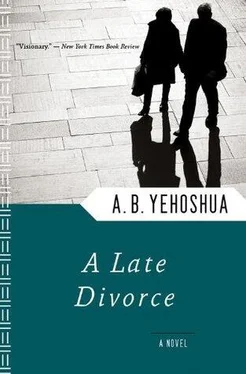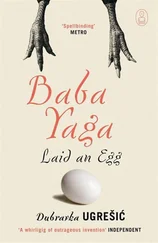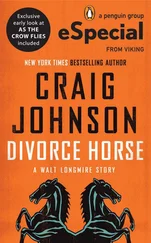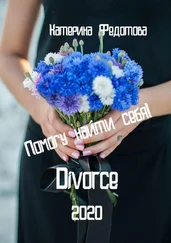In the end they were all persuaded to leave. The door closed on us. We took off our coats and Horatio ran happily wagging his tail around the room. My eyes scanned the books that lined the walls but it was impossible to read their titles because they were all covered with the same brown wrapping paper. What a dump. We stood around the cake, eyeing it nervously as though it concealed some harsh message. “Mother baked it for you all by herself,” said the old nurse, as though apprising us of a major psychiatric feat. A silent, younger nurse poured tea into the cups while Horatio thrashed restlessly about among our legs. I tried grabbing him by the collar and dragging him outside, but he growled aggressively and shook free, trying to bite me.
“Let go of him!” mother cried.
The old nurse handed her the knife. She made a movement to wield it, then suddenly shrank back, stealing a quick glance at father and releasing it.
“No, you cut it,” she said.
Quickly the cake was sliced into thick heavy pieces and we sat down to eat. Horatio climbed on a chair too, climbed down again, still rattling his broken chain, and jumped once more on father, as if the years that had elapsed since their parting were now running amuck in him and giving him no peace. Father smiled, lifting a full, shaky cup to his mouth. Mother rose, went over to Horatio, gave him a quick hard slap with the chain, and pushed him beneath father’s chair. She threw him a slice of cake there, which he sniffed at suspiciously and licked a little without eating.
No one spoke, not even to utter the simplest, most ordinary words. The cake had struck us dumb. I tensed like a bowstring each time I heard a noise outside the door. The giant’s face appeared at the window, staring in at us. We drank the lukewarm tea and ate the half-raw cake, which was a mishmash of colors and tastes. The two nurses ate too, the younger one chewing away at her end of the table as though compelled by a strong inner code, yet not quite certain what she was ingesting. Like in some relentless ceremony that we were all called upon to perform. The cake turned to a sickening goo in my mouth. Mother fed Gaddi, who sat beside her, but did not eat herself.
“You don’t have to feed him, mother,” said Ya’el softly. But she didn’t hear. She went on tearing off pieces of cake with her fingers and cramming them into Gaddi’s mouth while the rays of the setting sun slanted sharply off her painted cheeks.
“What a wind there was today,” sighed father all of a sudden. “All the way from Jerusalem.”
He resumed chewing his cake. Mother regarded him thoughtfully before turning back to look at Gaddi’s mouth, which hung slightly open.
Where are you, Asa? In a little cottage, a library for the insane, an abstract thought deflected from its path, shanghaied from its desk, on which an old lamp casts its light on papers and books, a sole beacon shining in the dark. The irretrievably lost hours. If only they would die already! If only the two of them would die. Why can’t they understand? Their nightly quarrels, like two old children, all their cursing and shouting each time I came home from friends or the Scouts. Ya’el was married already. Tsvi was in the army. I would slip off to bed but they would follow me there, sit down on the blanket, pull it off me, anything to have a referee.
“Aren’t you eating your cake?”
“No, mother, I’m not hungry.”
Ya’el rolled her eyes at me.
“You don’t have to be hungry to eat a piece of cake. Or don’t you like it…?”
“I do. I’m just full. I mean…” I was only making things worse.
Silence. Horatio had calmed down. He stretched himself beneath father’s chair and started to nuzzle his penis, licking it vigorously. A dull yellowish light filled the room. Perhaps they were dead already and I was visiting them in the underworld. Dutifully, slowly, father and Ya’el chewed their cake. Gaddi was already having seconds.
“You’re not eating yourself,” said father gently. “Your cake is delicious.”
Mother didn’t answer.
The young nurse rose to collect the dishes, adroitly removing my plate with what was left on it.
“Would you like some more?” mother asked father.
He nodded, hoisted by his own petard. A new slice of cake appeared on his plate and he set to work chewing that too.
The young nurse placed the dishes on a tray. Someone opened the door for her. She stepped outside, where waiting hands snatched the tray, and returned at once. She pulled the cord from the socket in the wall, wound it around the electric kettle, and took that to the door too. And again she came right back. Meanwhile the old nurse was murmuring something to mother while wrapping the remains of the cake in an old towel. The young nurse opened the door again. Heads peered in, whispered laughter. They were waiting for the leftovers. The two nurses left and shut the door.
“Who are all those people outside, friends of yours?”
Mother smiled ironically. “Friends…”
Horatio crouched next to her, his head turned, his eyes shut, bald patches like burn scars in his mangy red fur. Father gazed at him and reached out to pet him.
“Has ’Ratio been here all along?”
“Since when is he ’Ratio?” we scolded. “His name is H oratio. You never could get it right.”
Father smiled. “’Ratio… Horatio…”
“Maybe you should take him back with you to America,” said mother abruptly.
Father laughed.
“I hear you’ve had a particularly hard winter this year. I’m glad I brought a coat with me. At first I didn’t plan to, since it would already be spring here, and spring here is as good as summer. But in the end I brought it, and it’s a good thing I did…”
(Bring himself, he meant.)
Ya’el rose without a sound and handed him the plastic bag that had been lying by his chair.
“Oh yes, I forgot. I brought you a present.” He took the bag and went over to her. “It’s something that I bought you…” But he couldn’t remember what it was. He opened the bag to take a peek. “I believe it’s a robe and a sweater.” He looked at Ya’el for confirmation. “Yes, a sweater.”
He pulled out the big wool shawl and spread it on his knees.
“A sweater?” Mother seemed very touched.
Ya’el took the shawl and draped it around her shoulders.
“The colors are perfect for you.”
Mother stood up. The two of them helped wrap her in the shawl.
I sat immobile in my chair, thinking what a dangerous thing this tenderness between them was. I glanced at Gaddi, who had not taken his eyes off the dog.
“It’s just the thing for you,” said father.
“Thank you. You needn’t have bothered… did I ask for a present? It’s really very warm…” She wiped away a tear. “Once I had a shawl like this years ago… exactly like this one… how did you find it again?” She removed it, searching for the missing label. “You shouldn’t have wasted so much money, Yehuda. Really, you shouldn’t have. Perhaps you should give it to someone else… to Asa…”
She made as though to give me the shawl.
But father wouldn’t hear of it.
“How can you say such a thing? You don’t know how happy it makes me to see you so calm. It’s a great change for the better. I would have brought you more, but I left in such a hurry…”
“A hurry?’’
“As soon as I received your letter… and then Kedmi told me…’’
“Oh”
They were beating around the bush. The afternoon light was fading in the room.
Mother sat down again. “So what’s new in America?”
“America?” Father lit a cigarette while he considered. “America is a big place. But nothing is new there. We had a long hard winter too.”
Читать дальше












